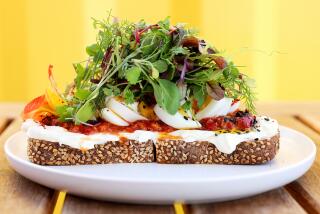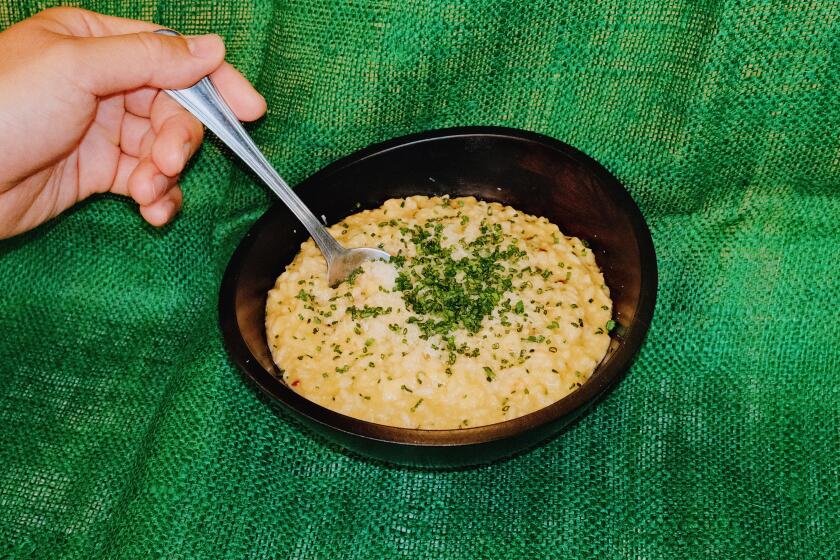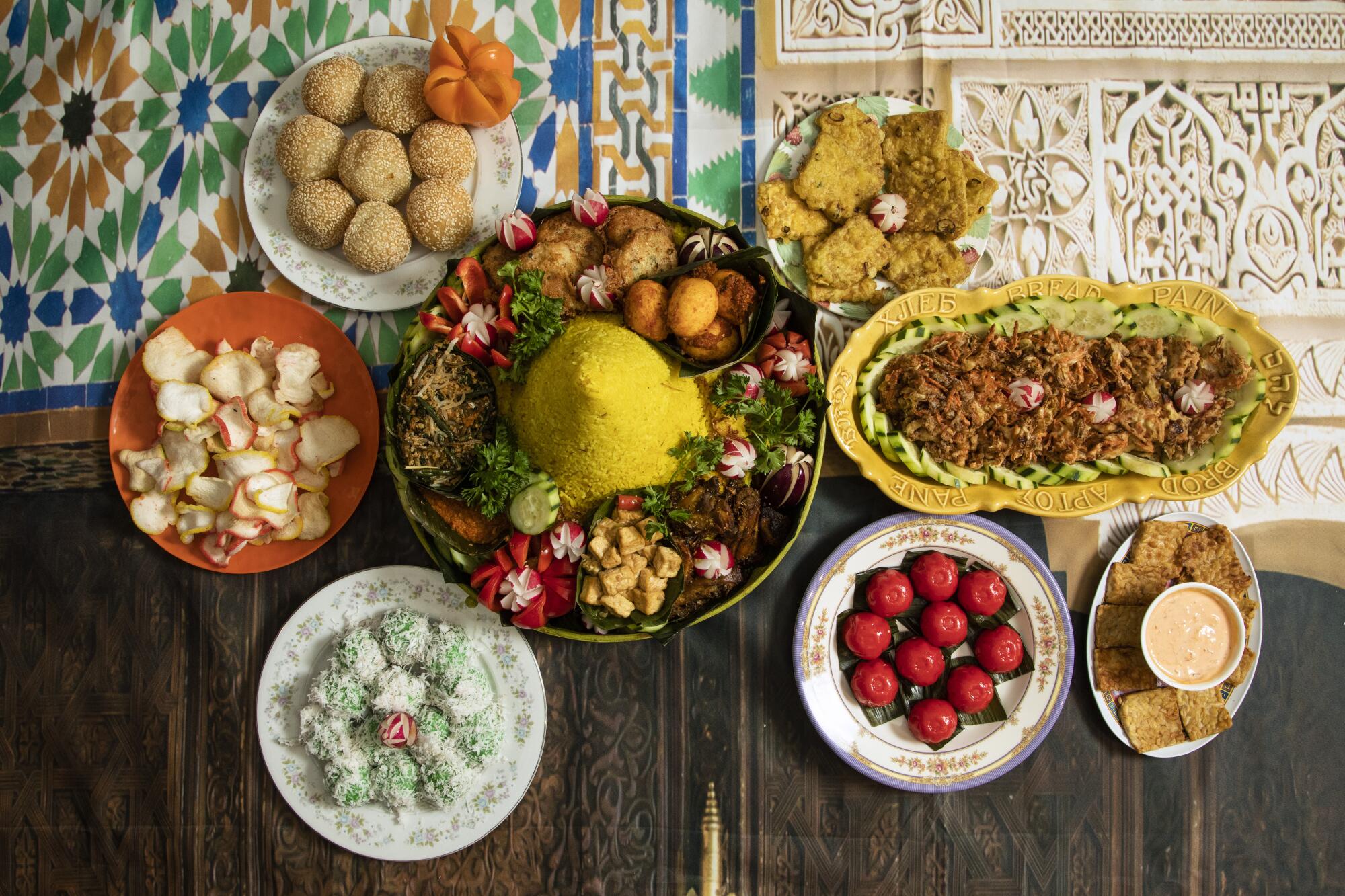
Indonesian cuisines thrive at houses of worship in L.A., where cooks share their prized dishes via webs of WhatsApp messages.
I am waiting for the post-sermon meal at the First Indonesian Baptist Church in Monrovia, listening to a service delivered in both English and Indonesian that even with my limited fluency I can follow. Pastor Paul Gunadi is recounting a story from Genesis about how Noah’s faith guided him when his path was unclear, relating it to our own lives when a challenge is presented.
“God is rearranging our lives, but if we look at it from God’s perspective, he is not rearranging — it is in his plan,” Pastor Gunadi says.
The sermon, about having faith in the unknown, reminds me of my painful exit from Indonesia, where I lived and reported during my early career as a journalist. I felt rudderless when I returned to Southern California, and I asked my Indonesian friends where the most enak or delicious Indonesian food could be located, in hopes of staying connected to the place that taught me so much. They told me some of the best Indonesian food isn’t found in bricks-and-mortar restaurants but in churches, mosques and catering services run by ibu-ibu or Indonesian matriarchs.
That’s why I’m at this church on a recent Sunday, not seeking religious succor necessarily, but food.
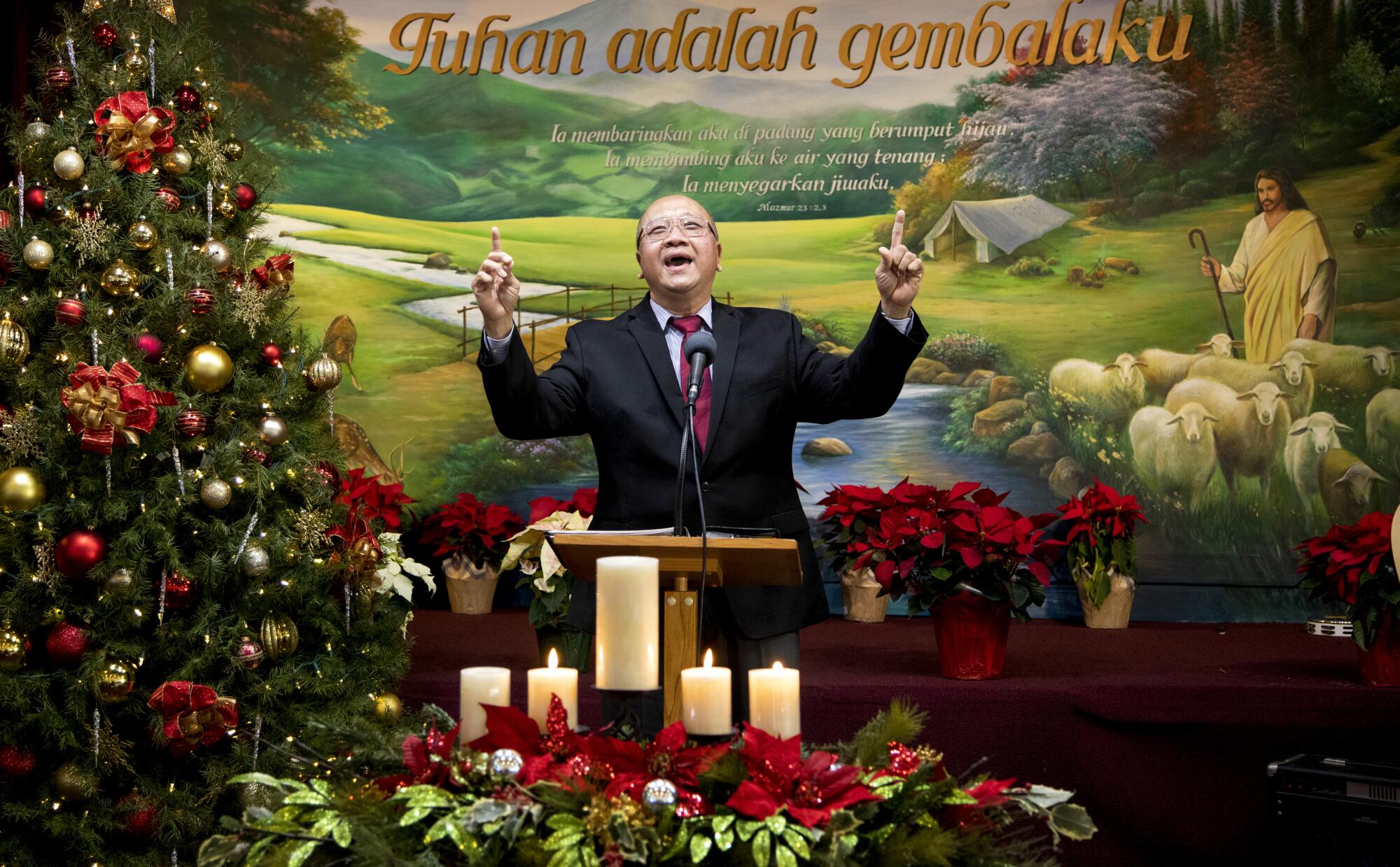
Adjoining the church hall is an open-plan kitchen, where congregant Brian Sam is already busy preparing and setting out the food for after the worship service. On the wall, there is a grid with handwritten notes about who will be bringing what dishes on what day. Sam is the keeper of the food. He feeds over 100 worshippers each weekend with cuisines that hail from Indonesia’s more than 17,000 islands, including greatest hits like soto mie, noodle soup; bubur ayam, chicken porridge; and nasi goreng, or Indonesian fried rice.
“I ask different families to cook every week,” Sam says while piling noodles onto a plate. “Next week is mie tek-tek (Javanese noodles). You’ll come back then, won’t you?”
::
Southern California is home to the largest Indonesian population in the United States, with an estimated 52,000 individuals, according to the Indonesian Consulate in Los Angeles. Yet you would be hard-pressed to find an Indonesiatown in the city. There are a few mainstay restaurants and a trendy pop-up of late, but there is no centralized place to settle or gather.
For many diasporic Indonesians in L.A., some of the best Indonesian food is found in community settings, served after religious services and disseminated through an intricate web of WhatsApp vendors known as rantangan, home caterers who would traditionally share their food in stackable stainless steel lunch pails.
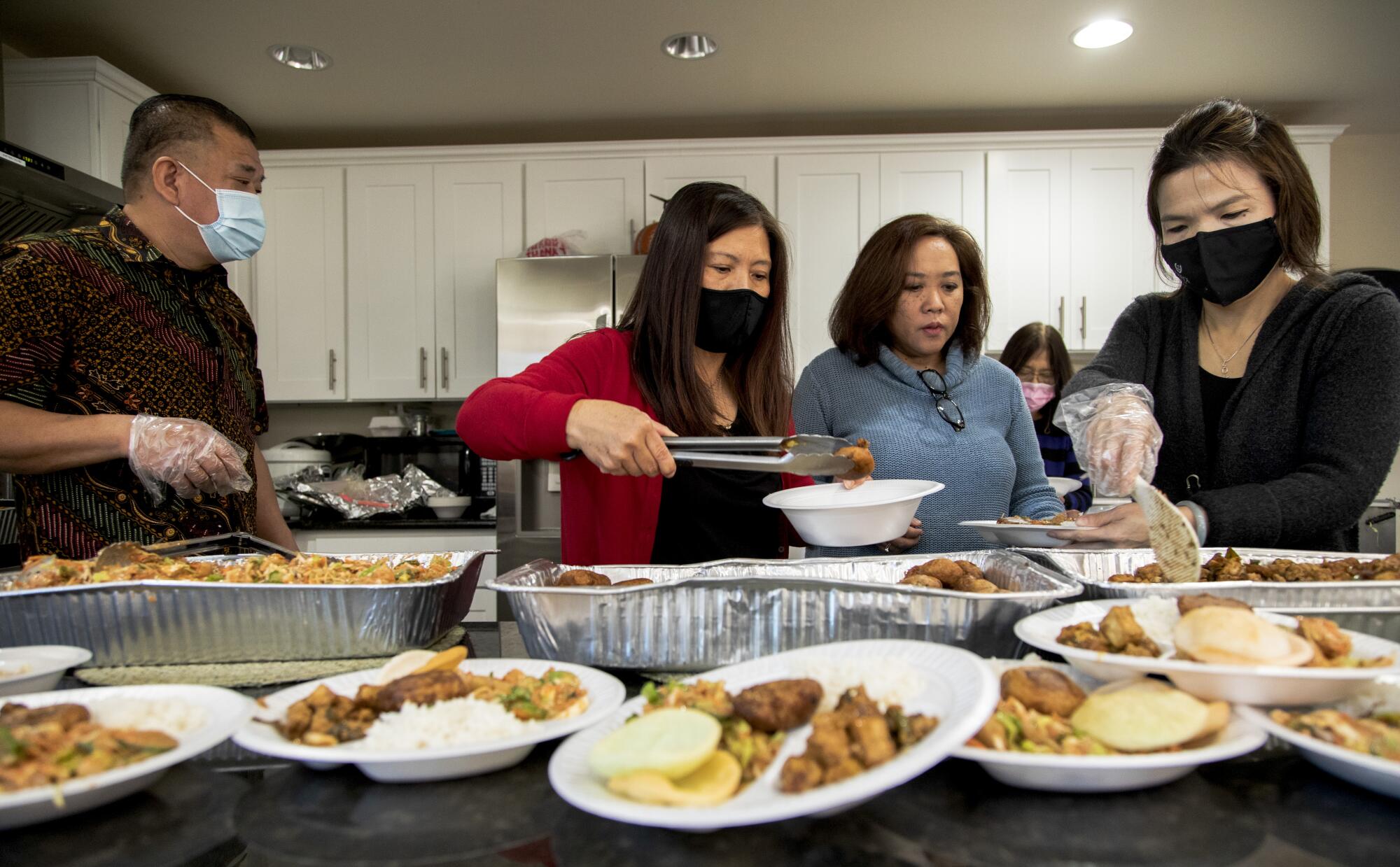
Through a chain of contacts on WhatsApp, as many things happen in Indonesia, I am connected to Ibu Resy Ismail, a rantangan chef, a few days after my visit to the church. (Ibu is the Indonesian honorific for women, as Pak is for men.) I reach out using a mix of English and Indonesian. Ismail responds only in Indonesian. I am tested. Through a series of Google-translated texts, we make plans to meet at my house in Silver Lake. When I follow up to confirm our meeting, all she says is “insha’Allah,” God willing.
Ismail arrives, a vision in a Canadian tuxedo, oxblood Tory Burch purse, hijab, and sparkly Michael Kors sneakers. She is instantly warm and lightly roasts me, as is my experience with older Indonesian women. I notice she is speaking English, though we were just texting in Indonesian.
“Oh, I just wanted you to practice your Indonesian,” she says.
She presents me with Indonesian food in a plastic grocery bag that says “Muchas Gracias!” Inside are some of my favorite Indonesian foods: beef rendang, one of the national foods of Indonesia; tempeh; and ikan goreng or fried fish. She encourages me to heat the food in my microwave and then asks if I have rice to accompany it. In Indonesia, there is a saying: “Belum makan nasi, belum makan” or “If you haven’t eaten rice yet, you haven’t eaten.”
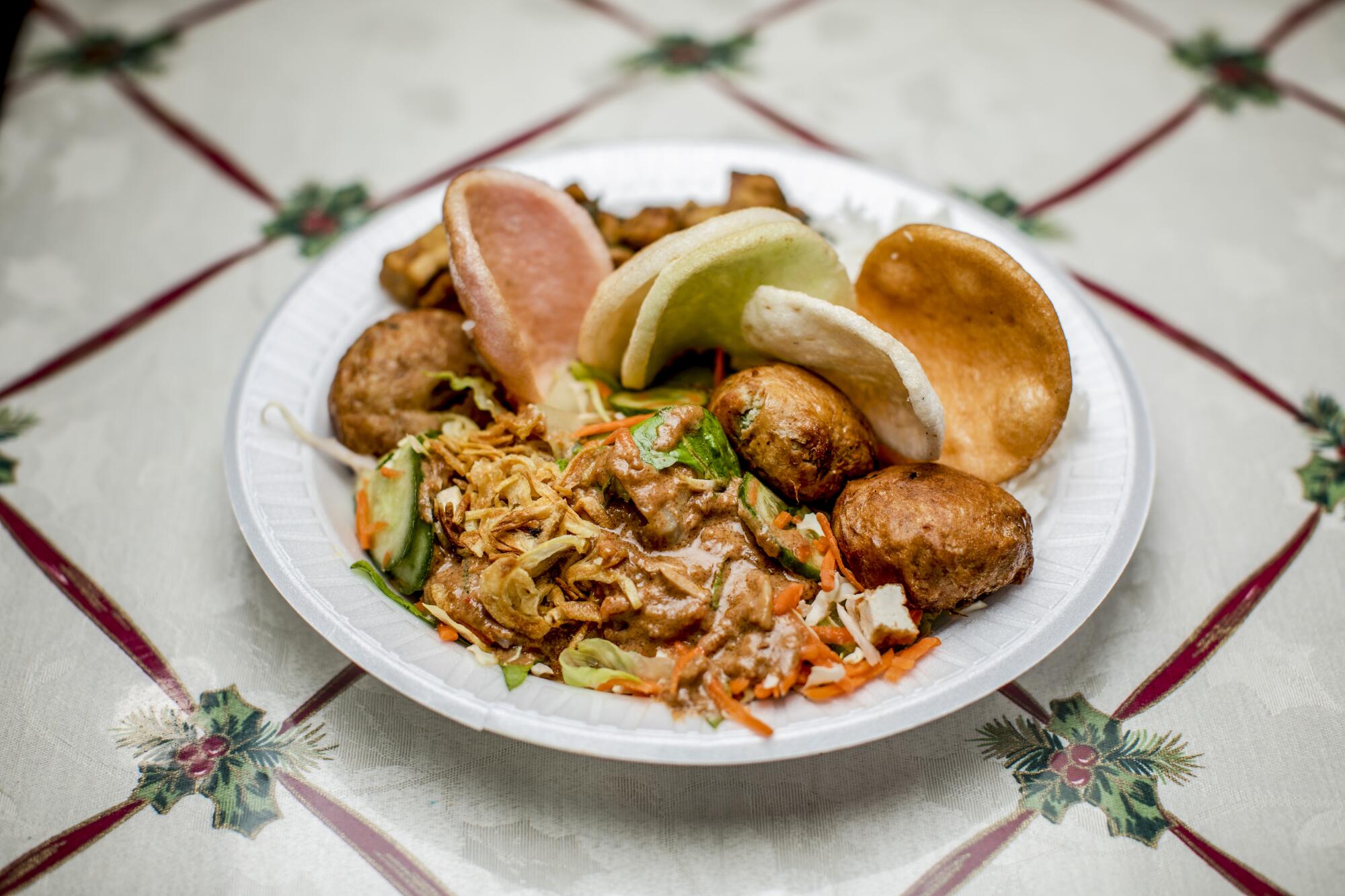
Ismail tells me she used to own an Indonesian restaurant in 2010 in West Covina, but business wasn’t good and she had a brutal commute from Reseda. Luckily, she has built such a name for herself that her clients now order from her directly as rantangan. Ismail announces the dishes on WhatsApp every week, then clients can pick up home-cooked Indonesian meals. She says business has been particularly good during the pandemic, when housewives are sick of cooking.
“The business has been rejeki. A blessing from Allah,” she says.
I start with a mouthful of tempeh tossed in chile and kecap (pronounced “ketchup” but actually meaning soy sauce). It’s one of my favorite and simplest dishes from Indonesia. I used to take breaks from my magazine job to visit the kaki lima, street vendors, in the back of my office building and eat the stuff.
The fish is laborious, requiring the use of my hands. I pick out little bones that give way to crispy fish skin doused in a spicy salty marinade of onion, bell peppers and eggplant. Last is the rendang: beef curry cooked in coconut milk with spices like galangal and lemongrass until the liquid evaporates. What’s left behind is a dry curry with the consistency of moist soil, like Indonesian terroir, often served for guests of honor, which Ismail is making me feel like.
“Ini enak sekali,” I say. This is extremely delicious. “Maybe the best rendang in America?” I say, teasing her a little bit.
Ismail blushes. “Maybe just the best in Los Angeles,” she says.
::
That same night, there is a Christmas bazaar at the Indonesian Consulate in Koreatown, promising more Indonesian food along with Christian worship. Indonesia is the largest Muslim country in the world, yet just 15% of Indonesian diaspora in Southern California is Muslim. Instead, the majority is Christian and often Chinese Indonesian. The ethnic group has experienced discrimination in Indonesia dating back to occupation by the Dutch, with the East India Company in 1740. In 1998, Chinese Indonesian businesses were burned and individuals were assaulted or murdered. It was the impetus for many to seek refuge in America. Many of these individuals are present at the consulate tonight.
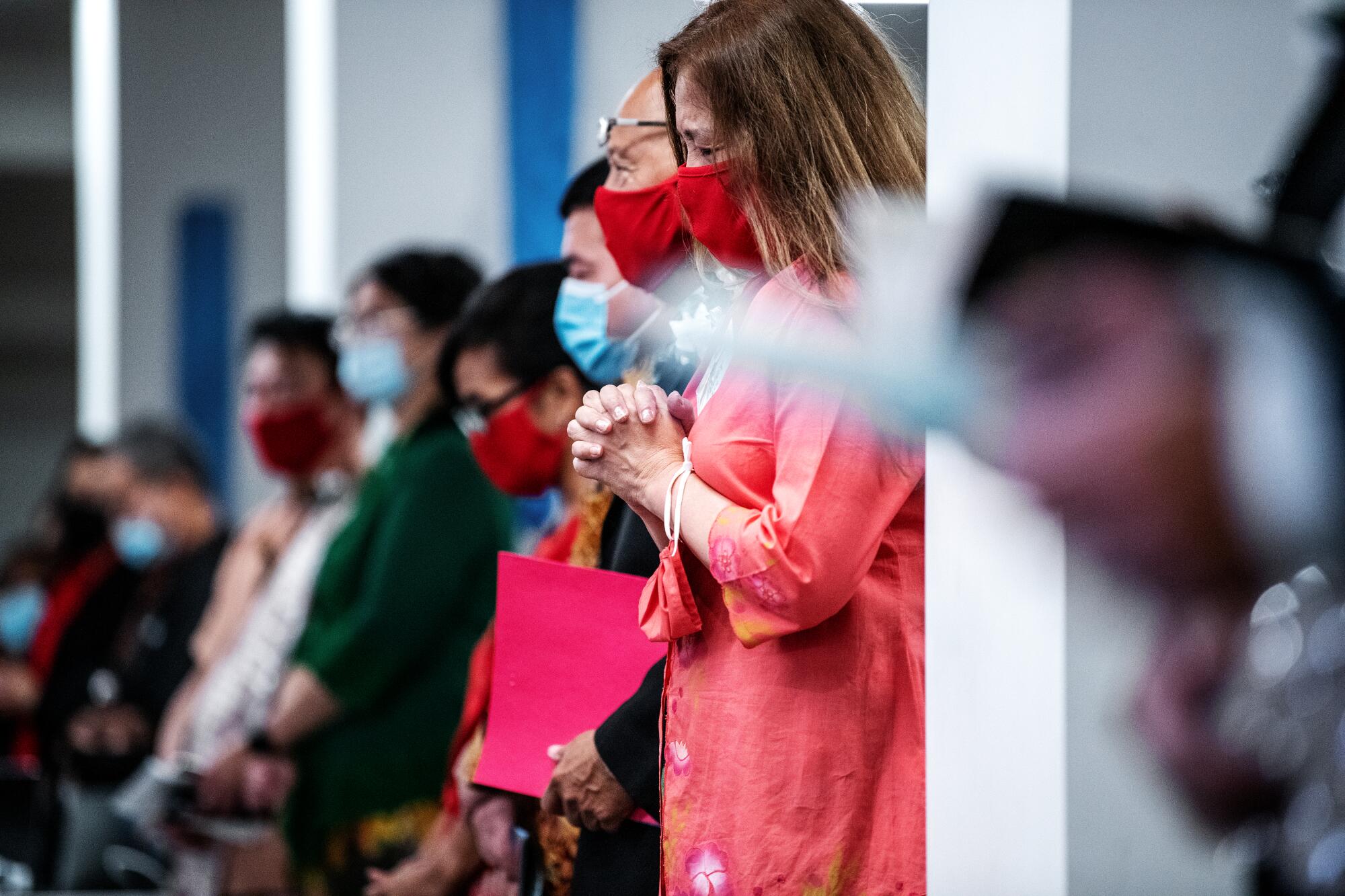
The consulate has its own version of a pop-up called Kantin Garuda, a small kitchen space in its parking lot. Every week, rantangan chefs take over the kitchen, offering a centralized place to pick up Indonesian food. Offerings are announced over WhatsApp. They are mostly halal vendors to accommodate the consulate’s partly Muslim population, and the clients are families spread throughout Southern California.
Ibu Fify Hendro, who runs Bumbu Dapur catering, invites me to try her food. She makes me a bowl of bakso, chicken soup with bihun noodles and meatballs. I load my bowl with fried scallions and sambal, Indonesian hot sauce.
“Kamu suka pedas!” Hendro comments on my bowl. “You like it spicy!”
“Saya suka pedas sekali! I really like it spicy! They used to call me bule gila, the crazy foreigner in Indonesia,” I say. Everyone in the kitchen laughs.
The night becomes a full contact sport for eating, reminiscent of many weddings I attended in Indonesia. There is siomay, Indonesian seafood dumplings; risoles, Dutch-Indonesian pastries like hot pockets, a relic of the colonial era; nasi padang, steamed rice served with curry; ayam goreng lengkuas, fried chicken topped with galangal floss, like hairy fried chicken; and soto betawi, beef and offal served in fragrant coconut milk. When I first arrived in Jakarta, I was offered the spicy-sour-sweet soup often, to the point of redundancy. Tonight I relish in the soul-warming curry, a taste tied to my earliest memories of Indonesia.
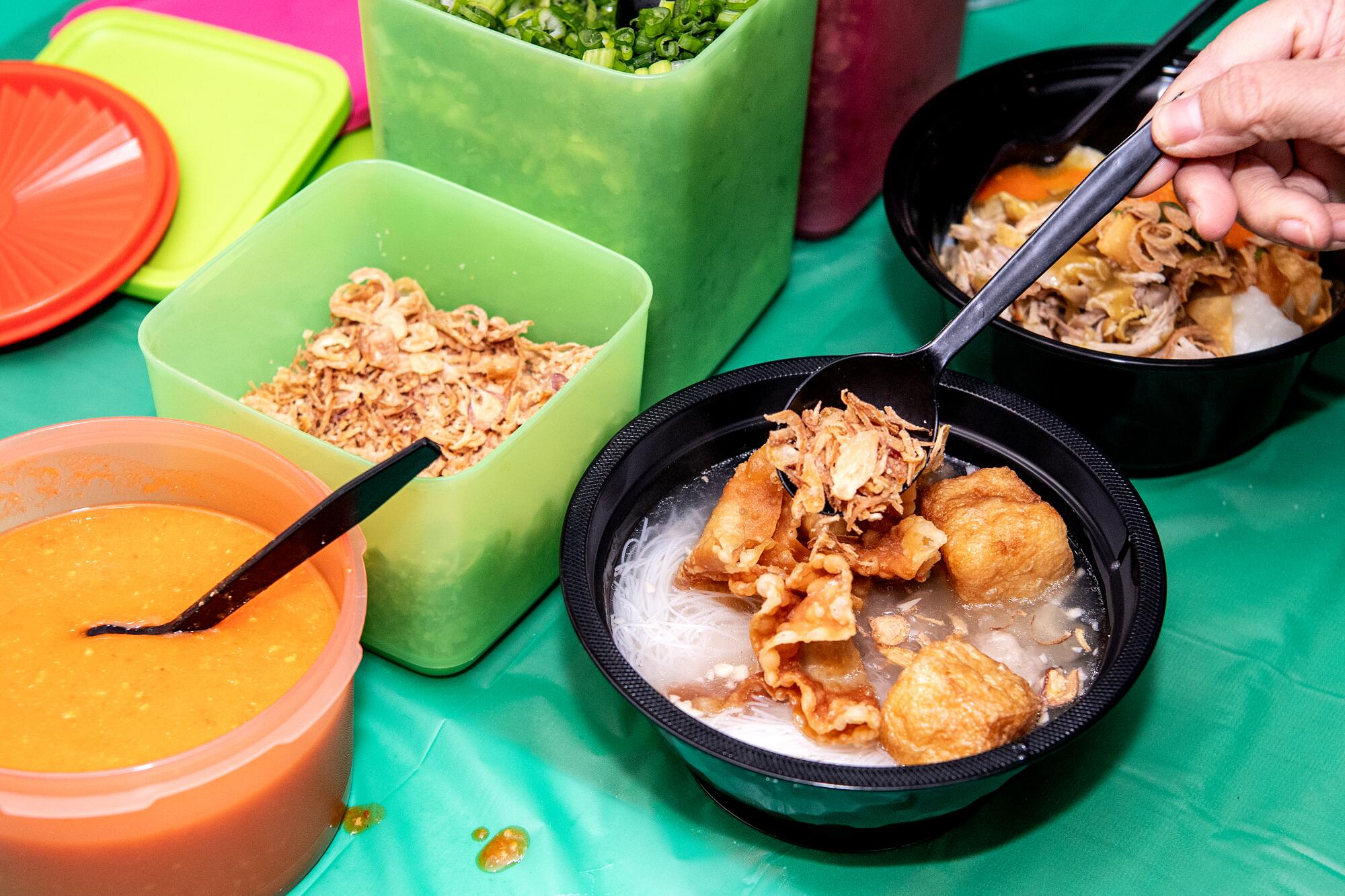
As I eat and chat with the ibu-ibu, Brian Sam, the coordinator of the food at the First Baptist Indonesian Church, notices me and comes to say hi.
“It’s nice to have you around,” he says. “You’ll come back when you’re done with the story, won’t you?” I nod bashfully, touched by his affection.
I slink into the back of the worship service in a crowded hall within the consulate. Everyone is wearing their Sunday batik best, intricate wax-dyed cloth that is the national garb. I spot a Chanel handbag or two. I’m full of food. The room is hot and stuffy. The service is entirely in Indonesian, and I feel myself being lulled into a headspace from seven years ago. During a particularly heartfelt version of “Malam Kudus” (Silent Night), I close my eyes and imagine I am back in Indonesia.
::
I spent two years reporting in Indonesia during the momentous period when President Joko Widodo was elected in 2014, defeating an old-guard politician that for many represented the previous authoritarian regime. I joined parades on the main boulevards of Jakarta with my coworkers when he won. But then something happened to me — something unexpected. I was hospitalized and my life in Jakarta was upended. I found myself back in Southern California knowing I didn’t want to be back here yet but also that I couldn’t return to Indonesia either.
In 2015, I went back briefly to Indonesia to collect my things and say goodbye, not knowing when I would return. I stayed in my former home in central Jakarta, not a luxury high-rise that oil executives or embassy folks lived in but a well-appointed family home, prone to leaks when it rained, near a wet market.
At one point, a delivery person came to the door and a new roommate, fresh to Indonesia, answered. He asked me for help so I translated for him. “Such a shame you are leaving,” the roommate said. “Your Indonesian is so good.”
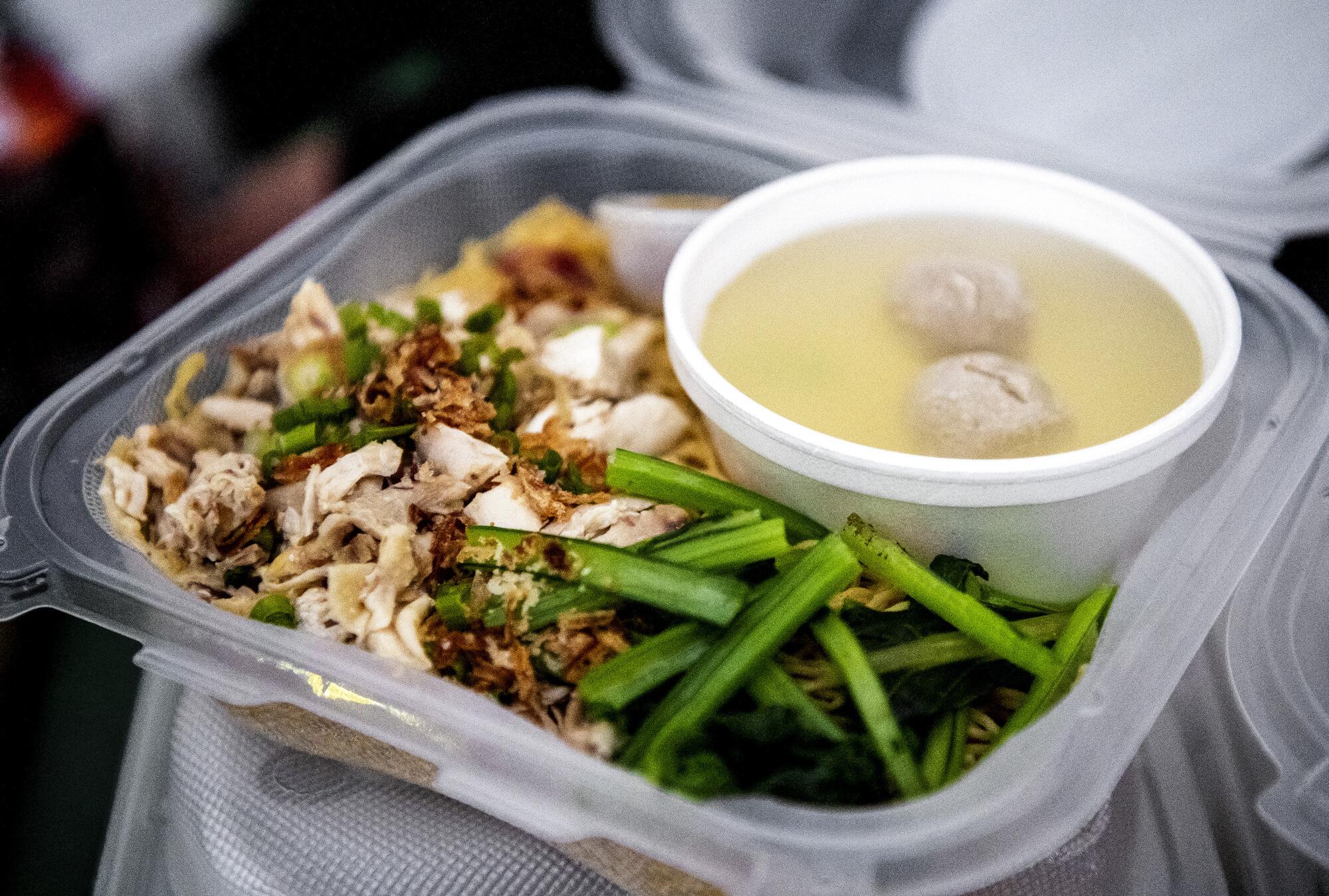
Day by day, I’ve started to forget the language. It slips by me. Only in dreams when I’m back in the archipelago do I practice. It pains me to say that I haven’t been back since.
During the reporting of this story, I practiced my Indonesian more than I had in years. It is another entry point to the memories quickly evaporating from my mind. A congregant tells me my pronunciation is good. “You must have learned it in the street,” he says.
“I actually learned it in the warung,” I tell him, the restaurant.
::
It has been a full weekend of WhatsApp-enabled freeway cruising to try Indonesian home-cooking, and my last stop is Masjid At-Thohir, a mosque not far from the Indonesian Consulate. All roads lead to Pak Dwirana Satyavat, a leader of the mosque and head of the Indonesia Muslim Foundation, as many have mentioned him to me during my reporting. For the Southern California Indonesian community, it truly is a small world.
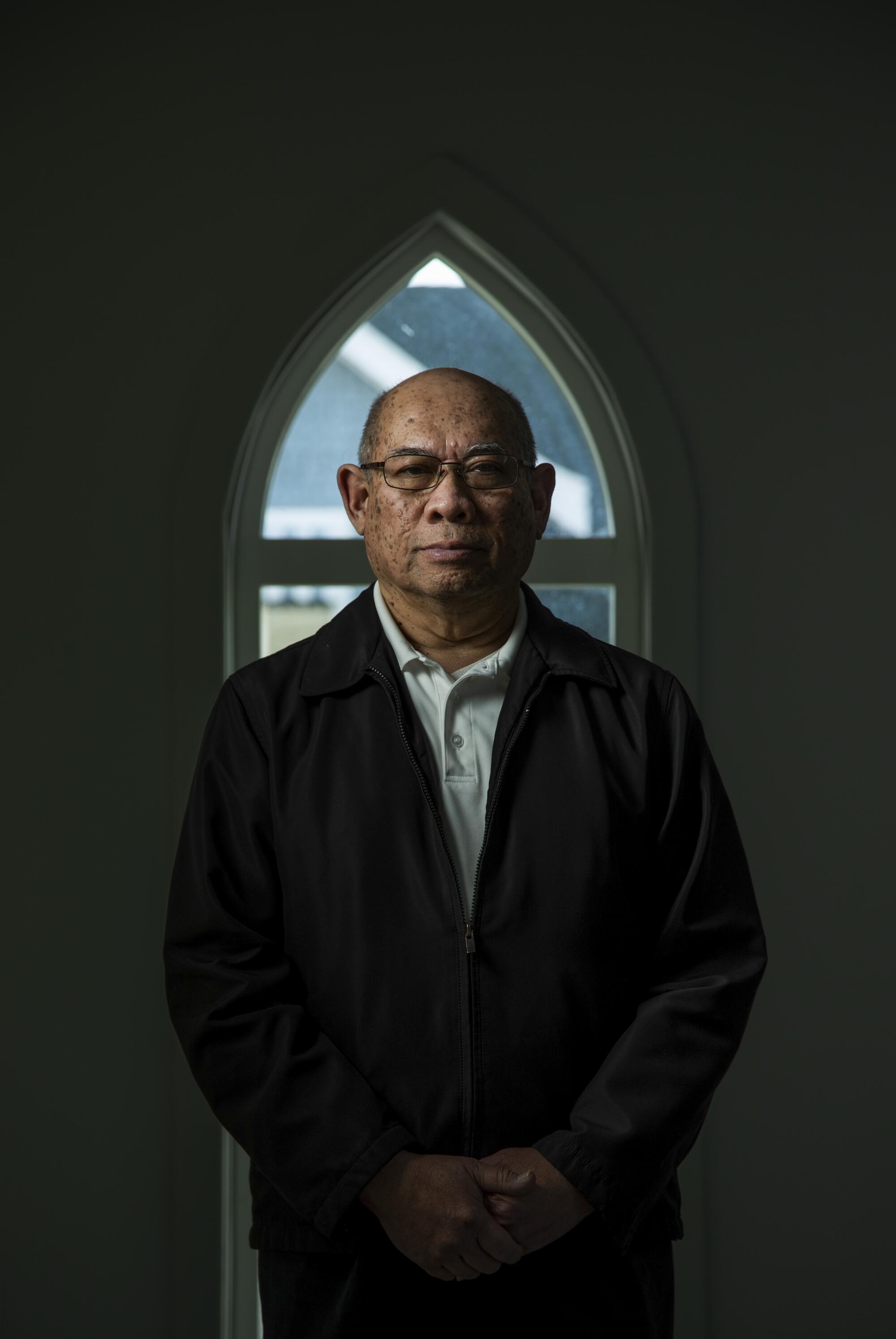
In recent decades, religion has been divisive in Indonesian politics, causing a ripple effect throughout the country. In 2006 a law promoting “religious harmony” among the country’s six main religions (Islam, Christianity, Hinduism, Buddhism, Confuscianism and Indigenous religions) passed, but it has since been largely criticized as an instrument to stifle religious freedom, according to Human Rights Watch. There has been a push for more secularism in response to fundamentalist provocation. A video in which a Christian student was forced to wear a headscarf in a public school went viral this year, prompting the banning of forced religious attire in schools.
Food has long served as an instrument for congregating, and it is no different in Southern California’s Indonesian population. Satyavat says that food is a means for coexistence in the diasporic community.
“We have different ethnic groups in Indonesia so we have different types of food. Sweet, hot, spicy, we have everything. And just like in Indonesia, whenever we gather [in Southern California] there is always food. Food is one of the things that keeps us together as a culture.”
Gathering together isn’t limited to just Indonesians; Satyavat tells me that Latino and Bangladeshi Muslims also worship at the mosque, joining prayer and using the facilities. “If you’re not Indonesian and you come to the masjid, that’s fine with us,” he says.
After we chat, a rantangan chef and mosque leader named Ibu Halimah Covalt serves us a feast, including sayur asem, tamarind vegetable soup; ikan asin goreng, fried salted fish; krupuk or shrimp chips; and a generous bowl of chile sauce with dried shrimp paste known as sambal teras.
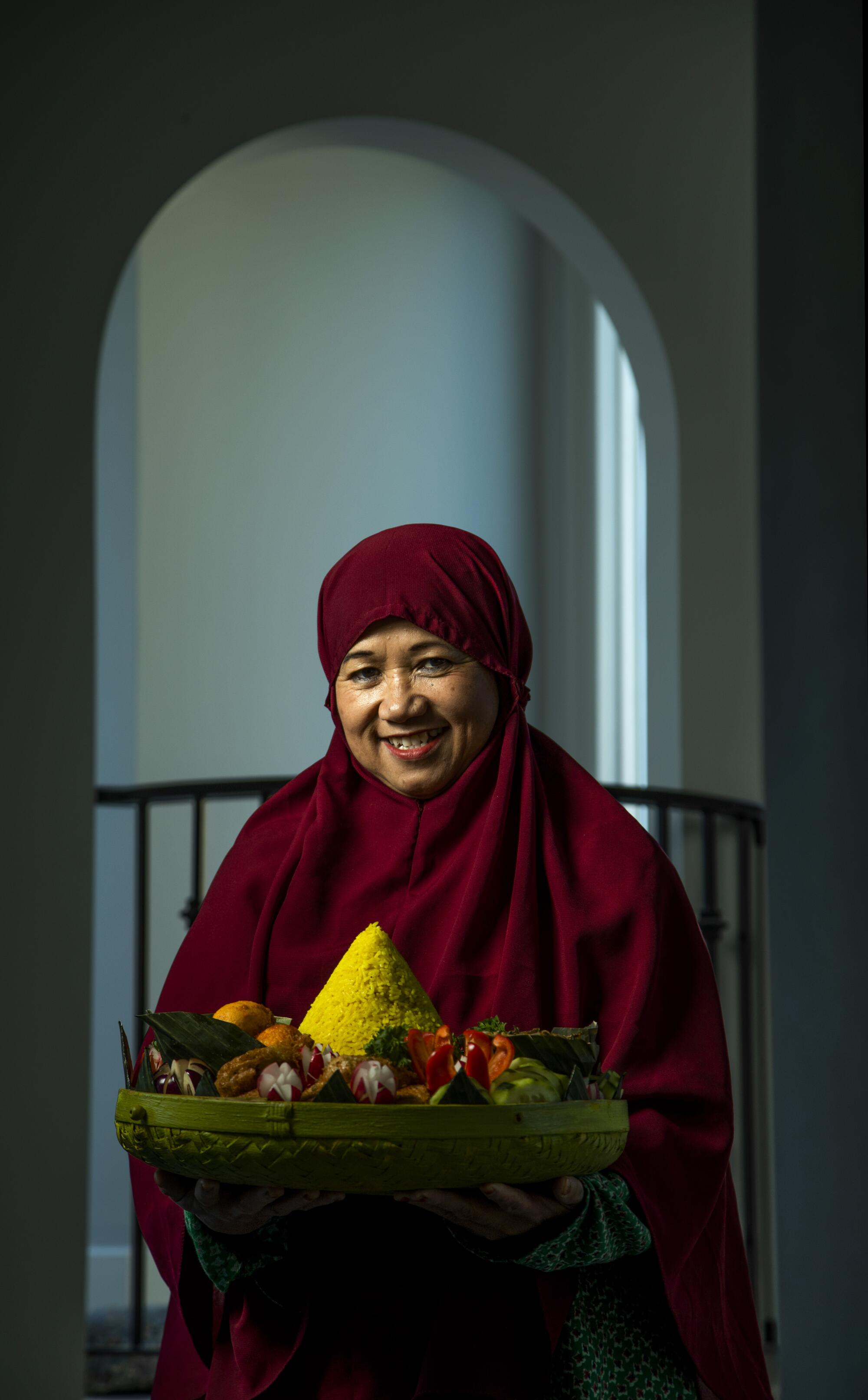
I make a huge plate, wanting to try everything. Men and women from the mosque, including a young imam, join us in a communal meal. They joke with me that I am “lapar mata,” with eyes that are hungrier than my stomach. I douse my food in sambal, the evening colored with the thought that this story will soon come to an end.
::
During my visit to the First Indonesian Baptist Church, I ask Pastor Gunadi after his sermon why he left Indonesia, as it is clear his bonds to the country are so strong. He is a kind man, measured and gentle. Gunadi, who is Chinese Indonesian, tells me he did not want to go back to Indonesia because of what he went through. “When I was a little boy, I got beat up just for being a Chinese boy. We had it rough but now it is better. I think it was worse before.” When he left in 1978, he swore he would never go back.
I felt adrift when I left Indonesia, before eventually ending up back in SoCal, home for many overseas Indonesians. Religion may be the ideology tethering the community, but food is surely the connective tissue. It is through the foodways, the WhatsApp messages, the playful teasing, the heaping plates, that I have been able to have this homecoming of sorts to Indonesia. Though leaving wasn’t by choice, in a way, it was God’s plan.
As I recall Gunadi’s sermon, I hear another voice in my head. A voice that says you are exactly where you need to be.
::
Rax Will (they/them) is a graduate of UC Riverside’s MFA program in fiction. They are at work on a memoir exploring their multiracial identity through food.
RANTANGAN CHEFS
Interested in ordering food from the chefs mentioned in this story? Vendors below welcome food orders via WhatsApp text messages:
Ibu Resy Ismail
WhatsApp: (818) 515-4017
Ibu Halimah Covalt
WhatsApp: (424) 558-2539
Bumbu Dapur (Ibu Fify Hendro)
WhatsApp: (909) 569-9075
IG: bumbu_dapur
More to Read
Eat your way across L.A.
Get our weekly Tasting Notes newsletter for reviews, news and more.
You may occasionally receive promotional content from the Los Angeles Times.
